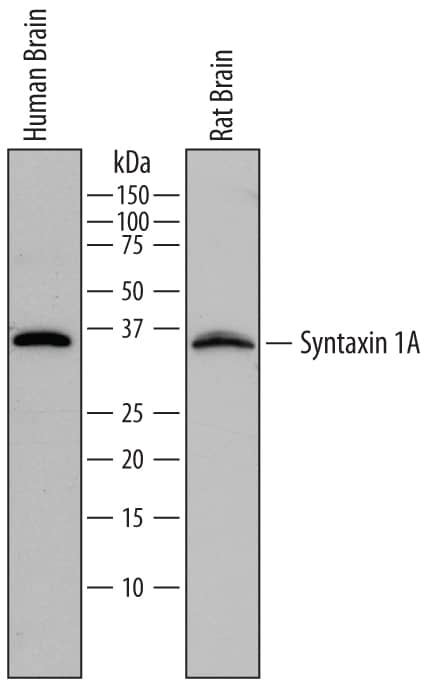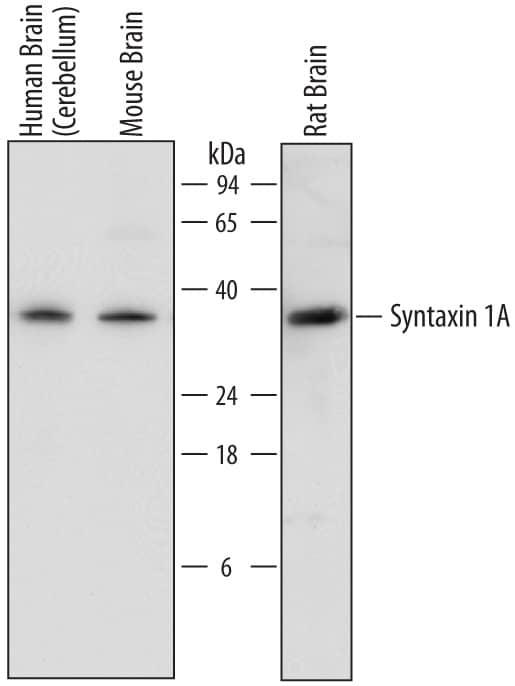Syntaxin 1A Products
Syntaxin 1A, also known as Neuron-specific Antigen HPC-1, is a type IV transmembrane protein that is part of the Syntaxin family of membrane SNARE proteins that play a role in vesicle exocytosis. Human Syntaxin 1A is 288 amino acids (aa) in length with a predicted molecular weight of approximately 33 kDa. It shares 98% aa sequence identity with the mouse and rat orthologs.
Syntaxin 1A contains a N-terminal coiled-coil region (aa 68-109) and a t-SNARE coiled-coil homology domain (aa 192-254). Its N-terminal domain appears to be important for binding to Munc13-1, 13-2, 13-3, Syntaxin-binding Protein 1, and Synaptotagmin I. Alternative splicing produces two different isoforms, one that contains a 34 aa substitution for aa 227-288 and a second, termed Syntaxin 1C, that contains a 25 aa substitution for the same aa sequence. Syntaxin 1A is highly expressed in neurons of the central nervous system.
Lower expression levels have also been detected in different populations of peripheral nerves and endocrine cells of the pancreas and gastrointestinal tract. Syntaxin 1A is transported intracellularly by the microtubule-associated protein Syntabulin, and its availability appears to be regulated through binding to LGI3. When released from LGI3, Syntaxin 1A interacts with additional t- and v-SNARE proteins to form the SNARE complex involved in exocytotic vesicle release.
10 results for "Syntaxin 1A" in Products
10 results for "Syntaxin 1A" in Products
Syntaxin 1A Products
Syntaxin 1A, also known as Neuron-specific Antigen HPC-1, is a type IV transmembrane protein that is part of the Syntaxin family of membrane SNARE proteins that play a role in vesicle exocytosis. Human Syntaxin 1A is 288 amino acids (aa) in length with a predicted molecular weight of approximately 33 kDa. It shares 98% aa sequence identity with the mouse and rat orthologs.
Syntaxin 1A contains a N-terminal coiled-coil region (aa 68-109) and a t-SNARE coiled-coil homology domain (aa 192-254). Its N-terminal domain appears to be important for binding to Munc13-1, 13-2, 13-3, Syntaxin-binding Protein 1, and Synaptotagmin I. Alternative splicing produces two different isoforms, one that contains a 34 aa substitution for aa 227-288 and a second, termed Syntaxin 1C, that contains a 25 aa substitution for the same aa sequence. Syntaxin 1A is highly expressed in neurons of the central nervous system.
Lower expression levels have also been detected in different populations of peripheral nerves and endocrine cells of the pancreas and gastrointestinal tract. Syntaxin 1A is transported intracellularly by the microtubule-associated protein Syntabulin, and its availability appears to be regulated through binding to LGI3. When released from LGI3, Syntaxin 1A interacts with additional t- and v-SNARE proteins to form the SNARE complex involved in exocytotic vesicle release.
| Reactivity: | Human |
| Details: | Mouse IgG2a Monoclonal Clone #761811 |
| Applications: | WB, IHC |
| Applications: | PAGE |
| Reactivity: | Human, Rat |
| Details: | Mouse IgG1 kappa Monoclonal Clone #1B11-1A8 |
| Applications: | WB, ICC/IF, ELISA |
Recombinant Monoclonal Antibody
| Reactivity: | Human, Mouse, Rat |
| Details: | Rabbit IgG Monoclonal Clone #SR1554 |
| Applications: | WB, Flow, IP |
Recombinant Monoclonal Antibody.
| Reactivity: | Human |
| Details: | Rabbit IgG Monoclonal Clone #RM367 |
| Applications: | IHC, WB |
| Applications: | ELISA |
| Reactivity: | Human |
| Details: | Rabbit Polyclonal |
| Applications: | IHC |
| Applications: | AC |
| Reactivity: | Human |
| Details: | Rabbit IgG Polyclonal |
| Applications: | IHC |
| Reactivity: | Human, Mouse, Rat |
| Details: | Goat IgG Polyclonal |
| Applications: | WB, ICC |



![SDS-PAGE: Recombinant Human Syntaxin 1A Protein [NBC1-18338] SDS-PAGE: Recombinant Human Syntaxin 1A Protein [NBC1-18338]](https://resources.bio-techne.com/images/products/Recombinant-Human-Syntaxin-1A-Protein-SDS-Page-NBC1-18338-img0002.jpg)
![Western Blot: Syntaxin 1A Antibody (1B11-1A8) [H00006804-M02] Western Blot: Syntaxin 1A Antibody (1B11-1A8) [H00006804-M02]](https://resources.bio-techne.com/images/products/Syntaxin-1A-Antibody-1B11-1A8-Western-Blot-H00006804-M02-img0010.jpg)
![Western Blot: Syntaxin 1A Antibody (SR1554) [NBP3-22343] -](https://resources.bio-techne.com/images/products/nbp3-22343_rabbit-syntaxin-1a-mab-sr1554-6720239533761.jpg)
![Western Blot: Syntaxin 1A Antibody (RM367) [NBP2-77428] Western Blot: Syntaxin 1A Antibody (RM367) [NBP2-77428]](https://resources.bio-techne.com/images/products/Syntaxin-1A-Antibody-RM367-Western-Blot-NBP2-77428-img0002.jpg)
![ELISA: Human Syntaxin 1A - Ready-To-Use ELISA Kit (Colorimetric) [NBP3-40163] Human Syntaxin 1A - Ready-To-Use ELISA Kit (Colorimetric)](https://resources.bio-techne.com/images/products/nbp3-40163_human-syntaxin-1a-ready-to-use-elisa-kit-colorimetric-2110202415343947.png)
![Immunohistochemistry-Paraffin: Syntaxin 1A Antibody [NBP3-14491] Immunohistochemistry-Paraffin: Syntaxin 1A Antibody [NBP3-14491]](https://resources.bio-techne.com/images/products/Syntaxin)
![Immunohistochemistry-Paraffin: Syntaxin 1A Antibody [NBP2-56031] Immunohistochemistry-Paraffin: Syntaxin 1A Antibody [NBP2-56031]](https://resources.bio-techne.com/images/products/Syntaxin-1A-Antibody-Immunohistochemistry-Paraffin-NBP2-56031-img0001.jpg)
